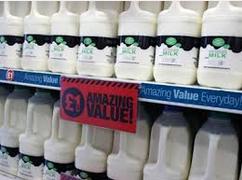In a letter to the Financial Times, representatives of Traidcraft Exchange Moore Stephens Food Advisory Sustain and the Tenant Farmers Association stressed the need for the UK government to deal with abusive practices along UK food supply chains.
These are recognised as being responsible for ruining otherwise viable farming and food businesses in the UK and all over the world and undermining the long-term interests of consumers. Currently, only the direct suppliers the UK’s large retailers are able to get protection via the Groceries Code Adjudicator. The writers welcomed the government’s recent consultation on fairness in supply and recommend a similar approach be applied to all food supply chains serving UK markets.
Chartered Accountants Moore Thompson report that following the consultation on the remit of the Groceries Code Adjudicator (GCA) a raft of new measures and rights will be introduced including offering a collaboration fund of up to £10 million by government and introducing compulsory milk contracts between producers and purchasers to help to protect dairy farmers. Using the contracts farmers and small producers will be able to clearly set out the price for the delivery of milk, the timing of deliveries, the duration of the contract, details of payment procedures, and arrangements for collecting and delivering raw milk. Business Minister Andrew Griffiths said the collaboration fund will open for applications later this year.
“This package of measures is designed to improve transparency and integrity within the food supply chain and to support collaborative business models where producers can come together to strengthen their position or work jointly on specific areas of work,” Farming Minister George Eustice explained, adding:
“Too often in the past, farmers have ended up being price takers and there have been too many instances where a lack of transparency in prices and charges by some processors has undermined the market. If we want a successful farming industry in the future then it is essential that we have properly functioning markets and that farmers receive a fair share of the value of the food they produce.”
Farming UK summarised: “A commitment has been made to work with the farming industry to explore improving transparency and access to prices along the supply chain, to help farmers and small producers see if they are getting a fair deal for their produce”.
However Private Eye’s Bio-Waste Spreader recently noted that the NFU’s letter to the Competition and Markets Authority about the Sainsbury/Asda merger warned of the dangers of putting a single supermarket in control of nearly a third of the UK’S food supplies.
The GCA 2013 Act cannot make any reference to ‘price’ and can only intervene between big retailers and their ‘direct suppliers’. The prices paid for produce can now continue to be driven down and supermarkets credit terms extended – as indeed Asda did last year; its clothing suppliers were warned that they would have to wait 50% longer to receive payment, as it was extending its terms from 60 to 90 days, no doubt causing many cash-flow problems.
 Bio-Waste Spreader quotes Nielsen’s data: in 12 weeks to 21 April, when the marker share of aggressive discounters Aldi and Lidl rose by average nearly 9%, mid-priced supermarkets by 2%, premium retailers Waitrose and M&S saw near static or falling sales.
Bio-Waste Spreader quotes Nielsen’s data: in 12 weeks to 21 April, when the marker share of aggressive discounters Aldi and Lidl rose by average nearly 9%, mid-priced supermarkets by 2%, premium retailers Waitrose and M&S saw near static or falling sales.
His verdict: consumers’ purchasing behaviour drives the process.
The late Andrew Hemming, vice-chair of Farmers for Action, disagreed.
He said the consumer paid a fair price, but the supermarkets and other middlemen took an unfair share of the profit.
0
o








Recent Comments